




Our falafel contains an artful mix of over a dozen different spices to give you a unique, rich and delicious flavour! Spice it up!

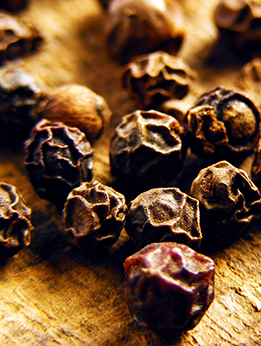
Black pepper is one of the most popular spices in the world. It may also be an ally in any battle against weight gain. A substance in black pepper called piperine may help block the formation of new fat cells, according to a recent study on mice (Journal of Agricultural and Food Chemistry, 2012; 60 (15)). Black pepper is an excellent source of manganese and vitamin K, a very good source of copper and dietary fibre, and a good source of iron, chromium and calcium.
Black pepper (Piper nigrum) stimulates the taste buds in such a way that an alert is sent to the stomach to increase hydrochloric acid secretion, thereby improving digestion. Hydrochloric acid is necessary for the digestion of proteins and other food components in the stomach. When the body's production of hydrochloric acid is insufficient, food may sit in the stomach for an extended period of time, leading to heartburn or indigestion.
Black pepper has demonstrated impressive antioxidant and antibacterial effects. And not only does black pepper help you to maximize the benefits from your food, the outer layer of peppercorns stimulates the breakdown of fat cells and gives you energy to burn calories, thereby keeping you slim.
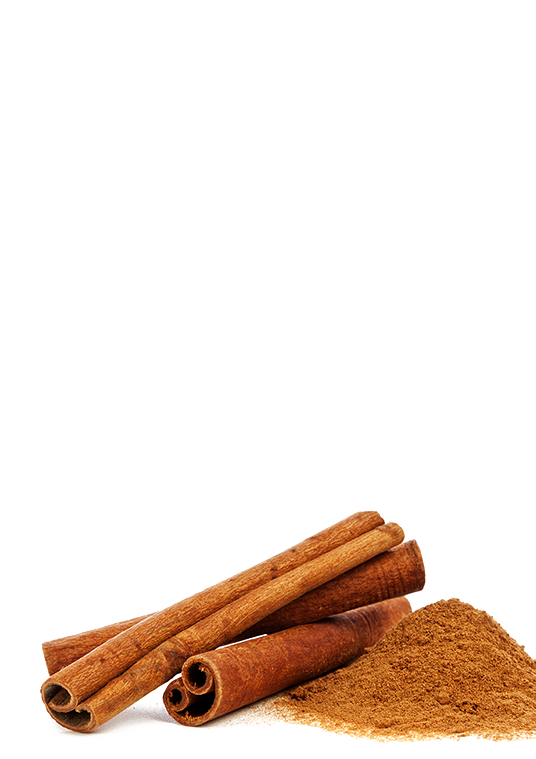





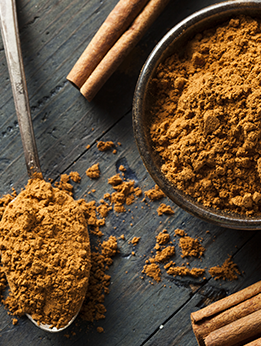
Who doesn’t love a sprinkling of cinnamon on fresh apple pie or on top of a chai latte? We have found it adds a little bit of extra flavour to our falafel too. It’s a fantastic tasting spice. But taste is not the only reason to love cinnamon.
It contains fibre, calcium, iron and manganese, and numerous studies have shown that cinnamon regulates blood sugar, making it a great choice for diabetics and hypoglycaemics alike. It is also great news for anyone who wants stable energy levels and mood.
Cinnamon reduces LDL cholesterol, known as the harmful cholesterol, given its role in cardiovascular disease.
It has natural anti-infective compounds. In studies, cinnamon has been effective against ulcer-causing H. pylori bacteria and other pathogens (Helwan University, 2010).
Cinnamon has further been shown in studies at the Department of Internal Medicine, Kangnam Korean Hospital (2012), to reduce cytokines linked to arthritic pain.
Research at the University of Texas, published in the Journal of Nutrition and Cancer (An Overview of Cancer Chemopreventive Potential and Safety of Proanthocyanidins, 2011) shows that cinnamon may reduce the proliferation of cancer cells, holding promise for cancer prevention and sufferers of the disease.

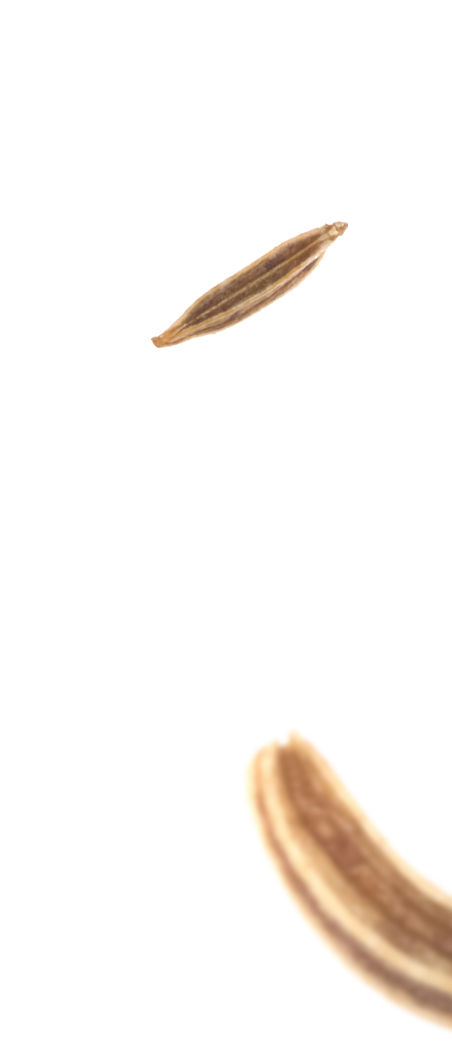



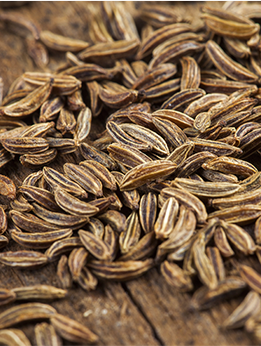
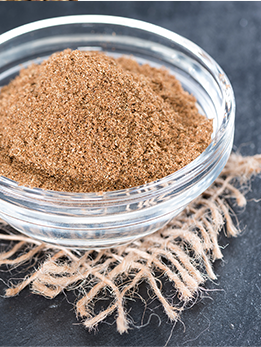
The health benefits of cumin include its ability to aid digestion and lactation, improve immunity and treat haemorrhoids, insomnia, respiratory disorders, asthma, bronchitis, common colds, anaemia, skin disorders, boils and cancer.
Cumin is extremely good for digestion and related problems. Its aroma, which comes from an organic compound called cuminaldehyde, the main component of its essential oil, activates the salivary glands in our mouths, which facilitates the primary digestion of food. Thymol, another compound present in cumin, then stimulates the glands that secrete the acids, bile and enzymes responsible for complete digestion of food in the stomach and intestines. Due to its essential oils, magnesium and sodium content, cumin promotes digestion and also relieves stomach aches when taken with hot water.
The common cold is a viral infection that affects our bodies when our immune system becomes weakened or vulnerable. Again, the essential oils present in cumin act as disinfectants and help to fight the viral infections that can cause the common cold. Cumin also suppresses the development of coughing in the respiratory system. It contains a considerable amount of vitamin C, which is essential for a healthy immune system and keeps infections from developing or becoming worse. Vitamin C is also a natural antioxidant, so it defends against other infections and toxins, thereby further boosting the immune system.
Cumin is rich in iron (more than 66mg in every 100 grams) and is thus very good for lactating mothers, as well as for menstruating and pregnant women, since they are in greater need of iron than others.
Vitamin E, which is present in abundance in cumin, is good for the maintenance of skin and the prevention of signs of premature aging. It keeps the skin young and glowing. The essential oils present in cumin also have disinfectant and antifungal properties.







Oregano is an important medicinal and culinary herb that has been used in medicine and cooking for thousands of years, with a number of potential health benefits. Its name comes from the Greek words oros (mountain) and ganos (joy) and apart from the flavour it provides when used in recipes, there are many health claims associated with its potent antioxidants and anti-bacterial properties. Oregano contains fibre, iron, manganese, vitamin E, vitamin K, iron, calcium, omega fatty acids, manganese and tryptophan.
Antioxidants help protect cells against the effects of free radicals and improve the ability to fight infection. A number of studies have also revealed oregano’s antimicrobial activity. For example, a team of British and Indian researchers have reported that the essential oil of Himalayan oregano has strong antibacterial properties capable of killing the hospital superbug MRSA (the University of the West of England, 2008). Furthermore, biologists at the United Arab Emirates University reported in the journal PLoS ONE that oregano exhibits anticancer activity by encouraging cell cycle arrest and apoptosis (cancer cells commit suicide) of the MDA-MB-231 breast cancer line (Anti-proliferative effects of carvacrol on a human metastatic breast cancer cell line, MDA-MB 231, Phytomedicine, Volume 17, Issues 8 17, Issues 8er cell line, MDA-MB 2Arunasree).
Oregano is also used for illnesses and conditions like colds, muscle pain, acne, dandruff, bronchitis, toothache, bloating, headaches, heart conditions, allergies, earache and fatigue.
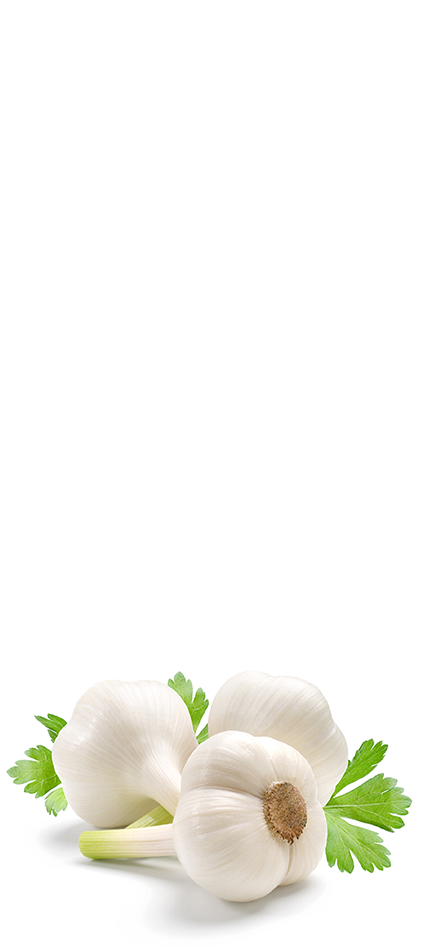






Garlic powder has all the benefits of whole garlic.
A study published in Lipids in Health and Disease (2010), found that garlic powder creates small reductions in total blood cholesterol and low-density lipoproteins, or ‘bad’ cholesterol.
Garlic strengthens the immune system, as well as helping to fight chest infections, coughs and congestion. In the winter months garlic is a fantastic way to boost your immune system and ward off colds and flu.
The National Institute of Health states that the effects of garlic on platelet aggregation have been assessed in several human trials, and garlic powder has been found to have a blood-thinning benefit, which can help people who suffer from high blood pressure and heart disease.
Studies have also shown the amazing benefits of taking garlic in relation to heart disease (Ackermann RT, Mulrow CD, Ramirez G, Gardner CD, Morbidoni L, Lawrence VA. Garlic shows promise for improving some cardiovascular risk factors. Arch Intern Med. 2001;161:813-824). Cardiovascular disease can be reduced by ingesting garlic, while LDL cholesterol and the aortic plaque deposits that gather on the walls of veins can also be reduced by it.
Garlic is a great source of vitamin B6 which is needed for a healthy immune system and the efficient growth of new cells. Vitamin B6 can also assist with mood swings.
Garlic regulates blood sugar as it enhances the level of insulin in the blood. This may assist in the control of diabetes.



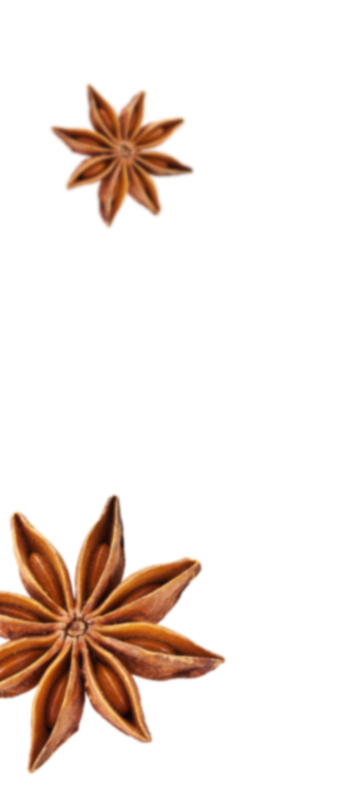

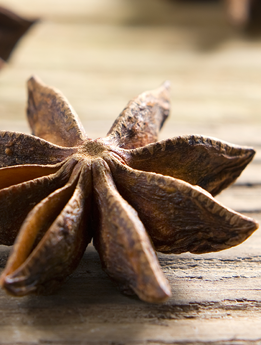
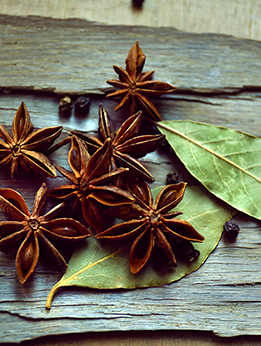
Star anise is the star-shaped fruit of an evergreen plant, known scientifically as Illicium verum. Originating in southern China, star anise has a licorice or anise-like flavour. Traditionally used as a spice and also as a healing herb, star anise has medicinal properties that endow it with significant health benefits.
The upsurge in bacterial infections that are showing resistance to existing antibiotics has intensified the search for new agents that may prove more effective against them. Researchers in Taiwan tested four new antimicrobial compounds from star anise and found that they were effective against 67 strains of drug-resistant bacteria. Chronicling their study in the October 2010 issue of the Journal of Medicinal Food, the researchers reported that their findings pave the way for the development of new antibiotic medicines from the star anise compounds they studied.
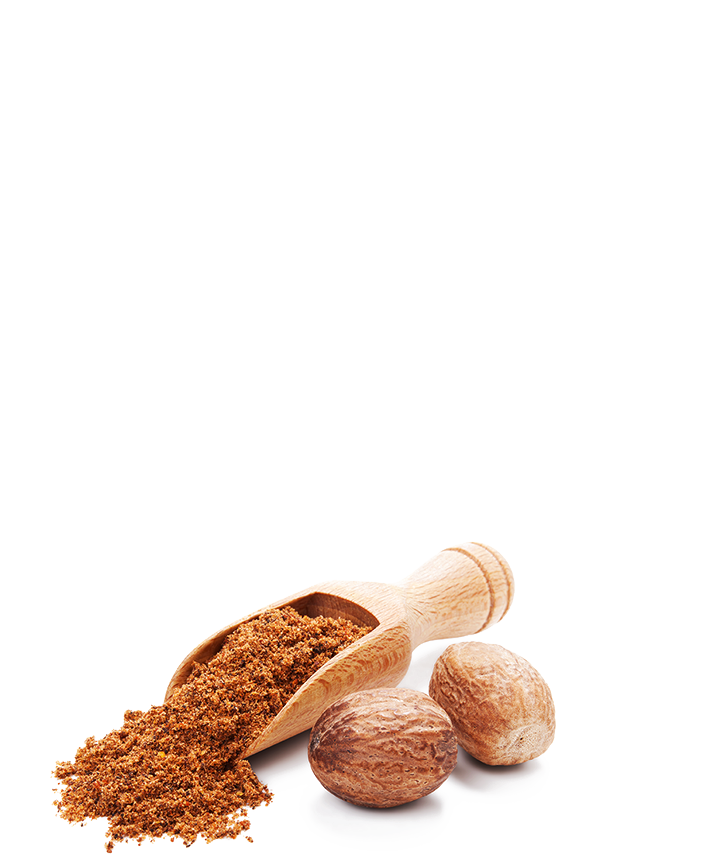




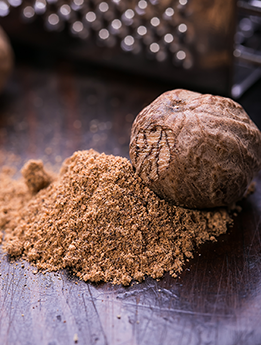
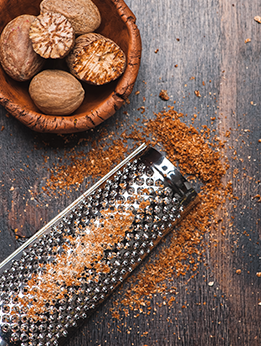
Like many other spices, nutmeg is fragrant and adds a little kick of warmth and curious complexity that, once tasted in a dish, can't be done without. Used in Chinese and East Indian cultures as a curative element and aphrodisiac, as well as a flavour enhancer, it was once a rare and costly spice prized by Byzantine traders who obtained it from Arabia.
Nutmeg imparts an incredible array of nutritional benefits. It contains antioxidants and essential oils that can both soothe and stimulate the brain, relieve joint, muscular and toothache pain, and provide anti-fungal, antidepressant and gas-inhibitive functions.
Nutmeg is rich in manganese, which assists with blood clotting and regulating blood sugar, metabolising carbohydrates and absorbing calcium. It also helps form tissues, bones and sex hormones.
Nutmeg is rich in copper, which is essential to human health. It must be synthesized by the body and absorbed on a regular basis since it can't be manufactured by itself.
Other health benefits of nutmeg come from potassium (for heart rate and blood pressure control), zinc and iron (for red blood cell production and as a co-factor for cytochrome oxidase enzymes), and B-vitamins, vitamins A and C, folate, riboflavin, niacin and the flavonoid antioxidants betacarotene and cryptoxanthin, which are essential for optimum health.
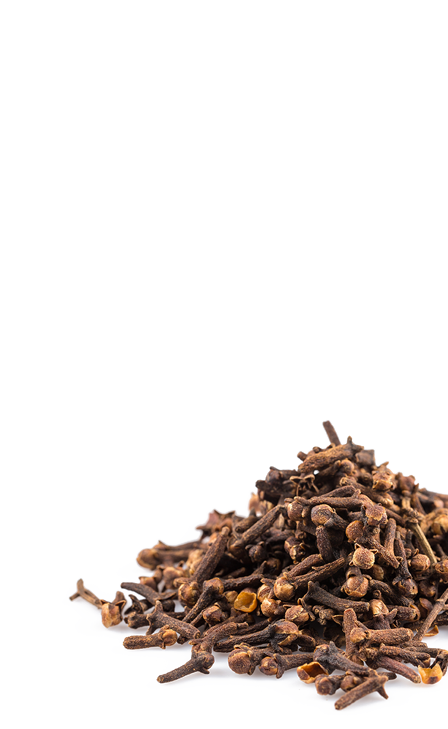




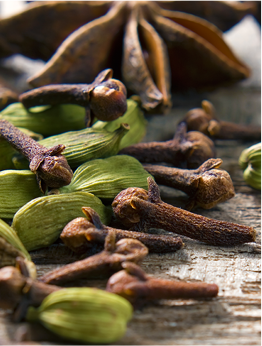

If you're seeking a way to prevent cancer, solve periodontal issues or add more zest to your sex life, clove may be the answer! Used throughout history and, a significant herb in traditional Chinese medicine, clove is a common, but often overlooked, spice. With an exceptionally high oxygen radical absorbance capacity and a multitude of crucial nutrients, clove is a major guardian of health.
Rich in omega-3 fatty acids, dietary fibre and vitamins C and K, as well as calcium, magnesium and manganese, this distinctive spice offers a potent defence against many of the ailments plaguing us today. Manganese is of particular interest, as it activates a variety of important enzymes within the body and plays a role in fat metabolism. Manganese also stabilises the nervous system, thereby alleviating depression, irritability and anxiety.
In addition, due to its high antioxidant rating, clove has substantial anti-cancer properties. In lab tests, isolated compounds of the spice were shown to suppress mutagenic cellular activity.
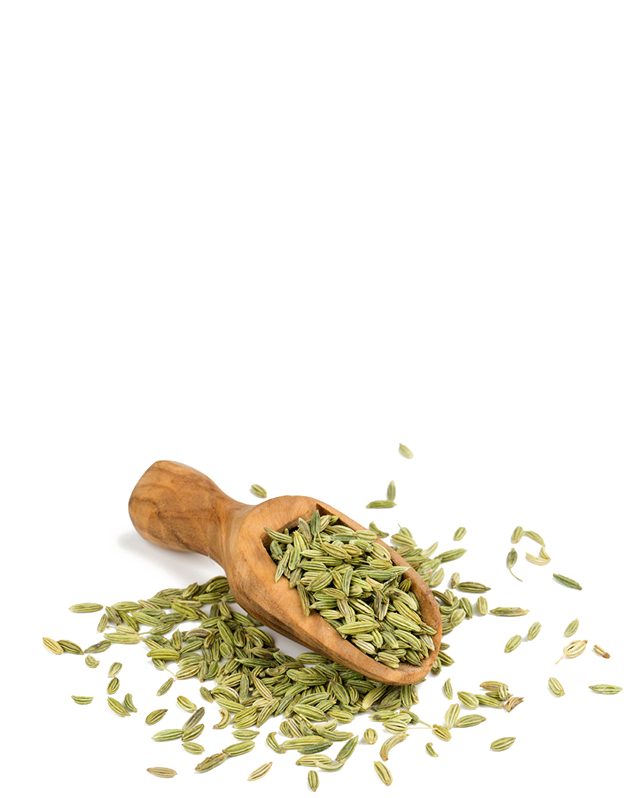






The health benefits of fennel include relief from anaemia, indigestion, flatulence, constipation, colic and respiratory disorders. Fennel, which has the scientific name Foeniculum vulgare Miller, or its essence, is widely used around the world in mouth fresheners, toothpastes, antacids and in various culinary applications.
Iron and histidine, an amino acid found in fennel, are both helpful in the treatment of anaemia. Iron is the chief constituent of haemoglobin, and histidine stimulates production of haemoglobin and also helps in the formation of various other components of the blood.
It is common practice, particularly on the Indian Subcontinent, to chew fennel seeds after meals. This is done to facilitate digestion and to eliminate bad breath.
Some of the components of the essential oils in fennel stimulate secretion of digestive and gastric juices, while reducing inflammation of the stomach and intestines, and facilitating proper absorption of nutrients from food. In culinary applications, it is used as an ingredient of many appetizers.
Fennel is a great source of fibre, but in addition to its advantages for digestion it also helps to maintain healthy levels of cholesterol in the blood stream.
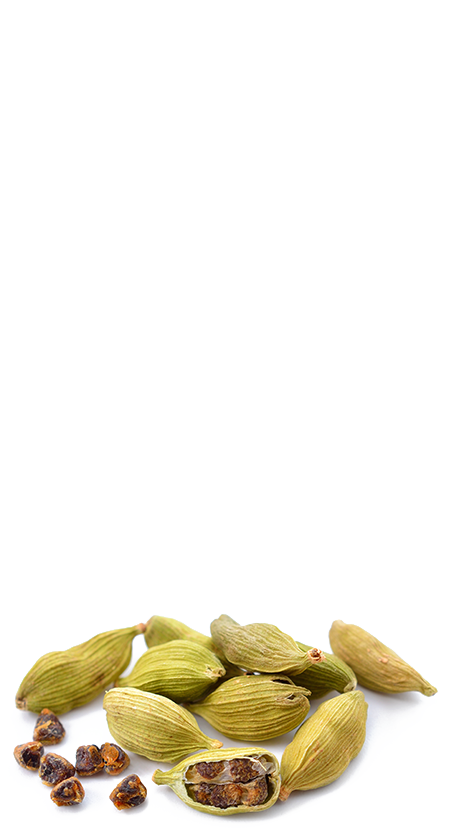


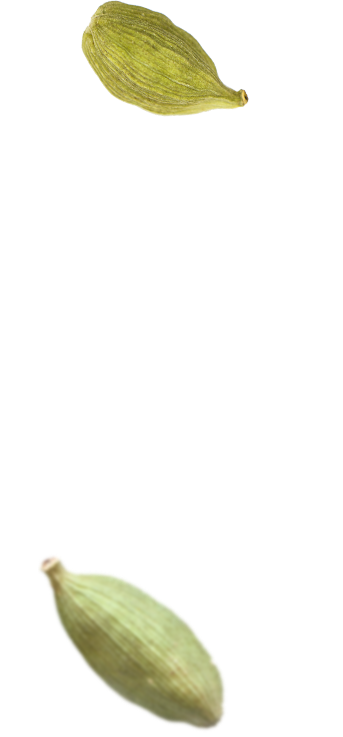



Cardamom is a spice that originated in India, Nepal and Bhutan. Today, it is grown in most tropical places in Asia, including India, China, Bhutan, Vietnam, Malaysia, Korea and Japan. It is regarded as the Queen of Spices and is among the most expensive, ranking third. The first and second are saffron and vanilla, respectively. The health benefits of cardamom include gastrointestinal protection, cholesterol control, control of cancer, relief from cardiovascular issues, and the improvement of blood circulation.
Cardamom is rich in various vitamins and micronutrients. These include niacin, pyridoxine, riboflavin, thiamine, vitamin A, vitamin C, sodium, potassium, calcium, copper, iron, manganese, magnesium, phosphorous and zinc.
Research studies conducted at the Department of Pharmacology and Pharmaceuticals at the College of Pharmacy of King Saud University, Saudi Arabia (2009) revealed that cardamom administration for cardiovascular conditions resulted in a lower heartbeat or controlled rhythm, and improved hypertension.
Cardamom contains antimicrobial properties. This theory was tested by Ağaoğlu et al. (2005) at Van Yüzüncü Yil University. Experiments were conducted on the volatile extracts of cardamom and it was observed that they were able to inhibit the growth and spread of some of the very dangerous microbes that regularly cause food poisoning.





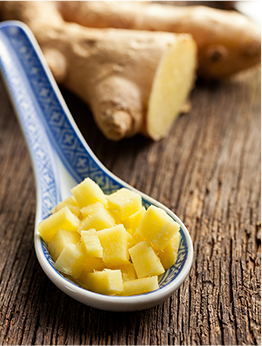
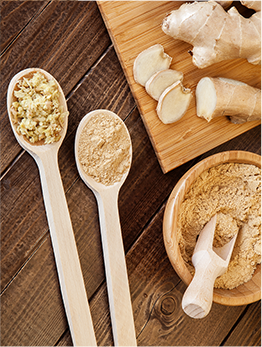
Although you probably know ginger best as a stomach soother, it may also help you to feel fuller and even burn more calories. Moreover, modern scientific research has revealed that ginger possesses numerous therapeutic properties, including antioxidant effects, an ability to inhibit the formation of inflammatory compounds, and direct anti-inflammatory effects.
Ginger is very effective in preventing the symptoms of motion sickness, especially seasickness. In fact, in one study, ginger was shown to be far superior to Dramamine, a commonly used over-the-counter and prescription drug for motion sickness. Ginger reduces all the symptoms associated with motion sickness, including dizziness, nausea, vomiting and cold sweats.
Ginger is not only warming on a cold day, it can help promote healthy sweating, which is often helpful during colds and flu. A good sweat may do a lot more than simply assist detoxification. German researchers have recently found that sweat contains a potent germ-fighting agent that may help fight off infections (Grzanna R, Lindmark L, Frondoza CG. Ginger - a herbal medicinal product with broad anti-inflammatory actions, J Med Food. 2005 Summer; 8(2):125-32).